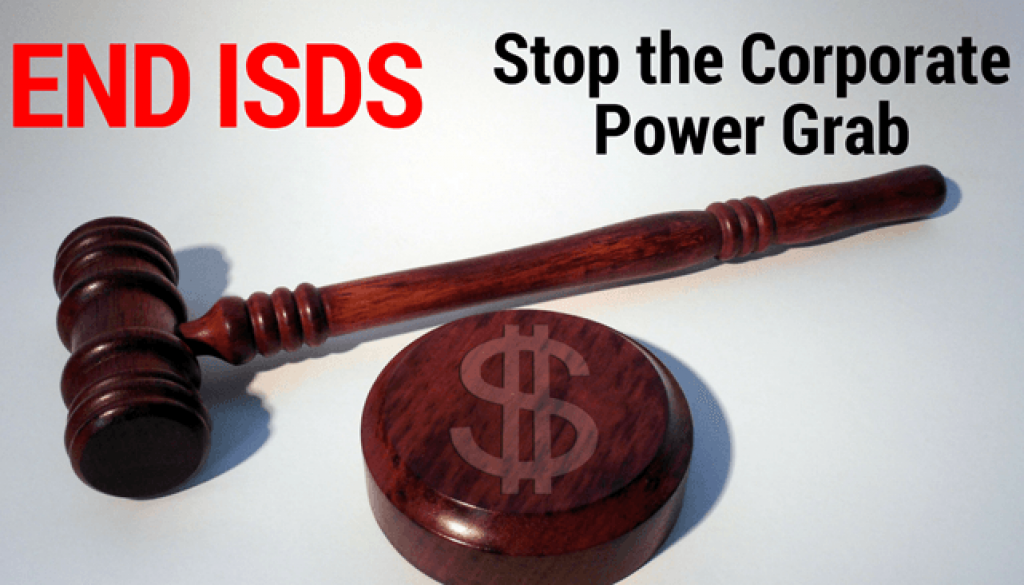Corporate Power Grab: Chamber of Commerce Fights to Preserve NAFTA ISDS Tribunals
As the United States, Canada, and Mexico begin talks aimed at renegotiating the North American Free Trade Agreement (NAFTA), the U.S. Chamber of Commerce is warningthe Trump administration not to touch investor-state dispute settlement (ISDS) provisions in the existing agreement.
What is ISDS and why is it so important to the Chamber, the nation’s largest corporate lobbying group?
ISDS gives multinational corporations the ability to challenge government policies not before the courts, but before international arbitration tribunals made up of three corporate lawyers. Multinational corporations can avail themselves of ISDS to challenge laws and regulations protecting consumer health and safety, the environment, and the stability of the financial system, among other things. If an ISDS tribunal rules in favor of a corporation, a government can be ordered to pay the corporation unlimited sums of taxpayer money, including for the loss of claimed future profits. What’s more, the arbitrators are not bound to legal precedent and their decisions cannot be appealed.
Quite obviously, ISDS is extremely problematic for a number of reasons. First and foremost, it undermines national sovereignty and the rule of law. Instead of national courts ruling on corporate challenges to national laws and regulations, unaccountable, supranational corporate lawyers-cum-arbitrators are given the power to decide whether laws enacted by our democratically elected government violate the special rights granted to corporations under NAFTA. How’s that for respecting the rule of law?
But beyond the foundational problem of handing over such immense power to supranational arbitrators, ISDS also presents the problem of being irretrievably riven by conflicts of interest. A corporate lawyer who represents a multinational corporation in one ISDS case may also serve as an arbitrator for a different ISDS case brought by a different corporation. Arbitrators are therefore incentivized to come up with novel legal interpretations favorable to corporate claimants which could in turn result in more corporations bringing more ISDS cases thereby creating more legal work for them in their capacity as lawyers. Even worse, arbitrators may have business or financial relationships with companies whose cases they are hearing.
The dangers presented by ISDS aren’t only theoretical; they are all too real. More than $390 million in taxpayer money has been paid to corporations in ISDS claims under NAFTA, with more than $36 billion pending in ongoing NAFTA cases.
In 2015, a NAFTA ISDS tribunal ruled against Canada in a case brought by a U.S. mining company. Canada’s crime? That its environmental impact assessment thwarted the American company’s plan to expand a quarry located in an environmentally sensitive area. The Canadian government was ordered to pay more than $100 million in taxpayers’ money to the American company.
Or consider an ISDS tribunal’s 2015 ruling against the Canadian government, ordering it to fork over more than $17 million in taxpayers’ money to Exxon. In this case, the government required any oil company operating in Newfoundland to contribute a small share of oil revenue to fund research and development in the economically struggling province in order to obtain a drilling license.
While the U.S. (and U.S. taxpayers) have thus far dodged the bullet of adverse ISDS rulings, we are far from immune to its dangers. For example, in 2016, TransCanada, the oil company behind the Keystone XL pipeline, sued the U.S. government before an ISDS tribunal, claiming $15 billion in compensation as a result of the Obama administration’s decision not to approve the construction of the pipeline. When Donald Trump reversed the decision, allowing the pipeline to move forward, TransCanada’s case remained in limbo until the White House clarified that a previous Trump executive order calling for pipelines to be constructed with American-made steel and pipe would not apply to Keystone XL. The State Department then promptly issued the permit, and TransCanada dropped its case. Close observers suspected that the quick permit approval and the Buy American steel/pipe waiver were likely the “settlement” price extracted from the Trump administration by TransCanada for dropping its NAFTA claim.
It’s only a matter of time before U.S. taxpayers are left on the hook, ordered to pay a corporation millions and perhaps billions of dollars by an ISDS tribunal. ISDS cases were once rather rare, with only 50 being filed in the 1950s, 60s, and 70s combined. But they are now exploding in number, with roughly 50 cases being filed in each of the last six years.
You might think that the United States Chamber of Commerce would show some concern for preserving the integrity of the American legal system and the rule of law, both of which have greatly contributed to the economic success of the United States. You would be mistaken. The Chamber’s dogged support of ISDS – an unaccountable, conflict-riven system than undermines state sovereignty in favor of corporate power – proves once again that it prioritizes corporate profits above all else.
For more information on ISDS, check out www.isdscorporateattacks.org. For more information on the U.S. Chamber of Commerce, you can always visit us on www.chamberofcommercewatch.org or follow us on Facebook and Twitter.

